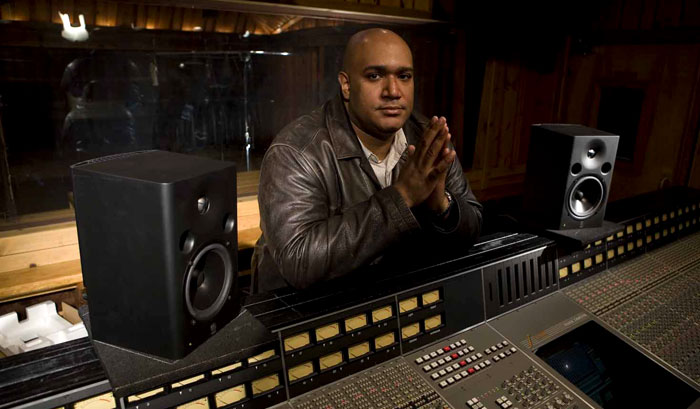


Engineer/mixer Eliud "Lou" Ortiz has worked with Shaggy, Christina Aguilera, Yolanda Adams, Luther Vandross, Lisa "Left Eye" Lopes, Roni Size, DJ Krush, and many others. So between R&B, rock, reggae, pop, hip-hop, electronic, and gospel, what's Lou's favorite genre to record and mix?
"Music that doesn't suck," he laughs. "As long as it's good, I don't care what style it is."
The MSP7s are honest--they don't trick you into thinking your mix sounds better than it does.
Ortiz, a lifelong New Yorker, got into the business young. After completing high school a year early in the late '80s, he took an internship at Soundworks, a studio renowned for its stellar remix work. "Soundworks was cutting-edge in its day," says Ortiz. "They had Teddy Riley, Shep Pettibone, Dennis Mitchell. Those were the guys I learned from."
Lou started out doing coffee runs and fetching tape. "I had to read a lot of manuals and ask a lot of questions," he remembers. "But I eventually got to track the Characters for an R&B version of the house song 'Lovely Day.'" Before long, Soundworks had offered Ortiz a job.
One early mentor was famed engineer Tony Maserati of NYC's Hit Factory, with whom Ortiz sometimes worked. "Tony is a friend to this day," says Lou. "He didn't play around--he was a real taskmaster. He was extremely honest, and if he hurt your feelings, too bad. He told me something early on that really made an impression: 'You don't want to be embarrassed.' That means you don't want to have someone pull up your tracks on a console and say, 'What idiot did this?' You want to make sure that whatever you record, it's ready to be mixed properly. That sounds simple, yet I see sloppy work all the time: poorly filled-out track sheets, tracks that drop out, vocals that appear out of nowhere. It's even worse now, with software-based recording, because it makes it easier to be inaccurate."
That's why Ortiz draws few distinctions between recording and mixing. "Mixing is just an extension of tracking," he insists. "If it doesn't sound good when you track it, it won't sound good when you mix it. Mixers shouldn't have to struggle."
These days Ortiz works almost exclusively with dancehall reggae superstar Shaggy. "Five years ago I went over to his place on a referral to repair some gear, and I never left," says Lou. "Shaggy is a great guy. He's as easy-come, easy-go as they get, and he always has your back."
When working with Shaggy, Lou seldom uses a recording console. "I pretty much work out of the box," he says. "I don't miss the console at all, because there have been so many software advances--especially in Cubase and Nuendo, which I use. I love them because of their flexibility. They're the only software applications I know that let you change every aspect of the GUI, and they come with an incredible bunch of plug-ins. You don't have to spend $20,000 on sound cards. In fact, now that CPUs are so much faster, that's just ridiculous. If anything revolutionizes DAW recording, it will be Cubase and Nuendo, because the manufacturers really make an effort to listen to engineers, the commercial industry, and laymen."
Ortiz typically alternates between the two Yamaha/Steinberg programs. "They do the same thing, but they do it a little differently," he explains. "It's a bit like switching between two great consoles. Sessions in Cubase are interchangeable with ones in Nuendo--you even have the same plug-ins. I tend to track in Cubase, and then move over to Nuendo to mix."
Another crucial tool is a pair of Yamaha MSP7 monitors, which Ortiz compares to Yamaha's discontinued NS10s, a longtime favorite among mixers. "The NS10s were great because they really let you know if you had a problem with your mix," he says. "The MSP7s sound warmer and rounder than NS10s, so they're less fatiguing on the ear. But they're still honest--they don't trick you into thinking your mix sounds better than it does. You can hear every fault in your mix, but without fatiguing your ear. I'm always telling engineers and producers about them!"
Lou takes his work seriously, but he still has fun with it. "Mixing is like a video game to me," he remarks. "I can sit there for hours tweaking. I might take a break to do something around the apartment or go for a walk, then get back to tweaking. I prefer that to the days when you had a fixed 12-hour session to mix a song. Now you're done only when you can't find fault with anything, and there's nothing left to mess with."
(Photography Credit: Jimmy Katz)
























